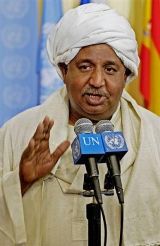US, Sudan support Annan’s call for more troops in Darfur
By EDITH M. LEDERER, Associated Press Writer
UNITED NATIONS, Sep 2, 2004 (AP) — U.N. Secretary-General Kofi Annan’s call for the quick deployment of an expanded international force to Sudan’s violence-wracked Darfur region got immediate support from the United States _ and an unexpected positive reaction from the Sudanese government.
 Sudan’s U.N. Ambassador Elfatih Mohamed Erwa told reporters late Wednesday that the government has no objection to increasing the African Union force in Darfur monitoring a rarely observed cease-fire signed in April. It currently has about 80 military observers, protected by just over 300 soldiers.
Sudan’s U.N. Ambassador Elfatih Mohamed Erwa told reporters late Wednesday that the government has no objection to increasing the African Union force in Darfur monitoring a rarely observed cease-fire signed in April. It currently has about 80 military observers, protected by just over 300 soldiers.
“The secretary-general is speaking about the monitoring, and increasing the forces for the monitoring. That’s fine with us,” he said. “Whether it is 300 or 3,000, if it helps, that’s fine.”
But Erwa said Sudan would oppose an international force with another mandate, for example to disarm militias or other groups because that could lead to military confrontations.
Annan did not say how large a force he wanted, but U.N. diplomats said a U.N. plan presented to the African Union called for about 3,000 peacekeepers. The 53-nation African organization, led by Nigeria, is expected to make a recommendation in the coming days, the diplomats said, speaking on condition of anonymity.
U.S. Ambassador John Danforth said Washington’s main concern is to get outsiders into Darfur as soon as possible.
“Call them monitors,” he said. “The issue is getting a substantial number of people in there, and getting in there as quickly as possible … (with) people who have credibility in the eyes of the people of Darfur.”
The secretary-general urged the speedy deployment of an expanded force in a report to the U.N. Security Council Wednesday which said Sudan’s government has not stopped attacks on “terrorized and traumatized” civilians in Darfur or disarmed marauding militias.
His top envoy to Sudan, Jan Pronk, was scheduled to brief the council on the report Thursday morning at a public meeting and later answer questions from the 15 members at a closed-door session.
Danforth, a former senator from Missouri who recently was the top U.S. envoy to Sudan, criticized the government for failing to meet its obligations under a Security Council resolution adopted on July 30. It gave Sudan 30 days to demonstrate it was curbing nomadic Arab tribes accused of killing thousands in attacks on African farm villages and also improving security and access for aid groups.
The resolution threatened punitive economic and diplomatic measures if Sudan didn’t move quickly.
“The disaster of Darfur continues,” Danforth said. “People continue to be abused. The security problem has not been solved. The number of displaced persons has increased. … It continues to be the world’s leading humanitarian disaster, and the world’s leading example of one country abusing its own people.”
He said “the prospect of sanctions is out there” and could be imposed next week, next month or at a later date.
While the report cited “some progress” by the Sudanese government in complying with the council resolution, its tone was quite critical and it stressed that Khartoum needed to do much more.
Nonetheless, Sudan’s Erwa said “If it’s read objectively, I think it is balanced.”
Stemming from long-standing disputes over scarce water and arable land, the conflict in Darfur erupted when two African groups rebelled last year accusing Sudan’s Arab-dominated government of siding with the Arab herders. Aid groups have accused the government of encouraging and supporting the militia attacks, a charge Sudanese leaders deny.
To help provide security, Annan told the council “a substantially increased international presence in Darfur is required as quickly as possible.” He said an expanded force could decrease the level of violence and enhance the protection of civilians, particularly refugees, providing a respite that would allow the people of Darfur to start reconciliation.
Last month, the African Union proposed sending nearly 2,000 peacekeepers to Darfur, a move strongly backed by the United States but rejected by the Sudanese government, which insisted it should control the security situation. The organization is expected to make its recommendation on an expanded international presence in the coming days, the U.N. diplomats said.
